Change Language :

News from young engineers support
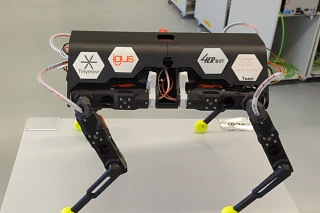
VierBot - low-cost robot from the 3D printer
A four-legged walking robot is being developed at the Baden-Württemberg Cooperative State University (DHBW) Mannheim to serve as a research and learning platform for students. In view of the high prices of commercial robots and the desire to create their own solution, the students ventured to design and develop their own robot - all from a 3D printer. However, the path to realising their vision was not without its challenges. The team began by developing and 3D printing an actuator module that could withstand the dynamic requirements and still be cost-effective. Several of these modules were used to construct and assemble the first leg along with a test rig, allowing the slowly emerging silhouette of the robot to be recognised. After numerous tests, however, it became apparent that the filament used (PLA) was too elastic and at the same time had a considerable mass. Thanks to the support of igus®, the team was able to achieve a breakthrough. By using igumid® P150, a carbon fibre-reinforced filament, and xiros ball bearings, it was possible to reduce the weight of each actuator module by around 18%.
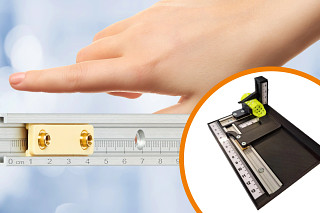
Custom-fit orthoses from the 3D printer
Orthoses that rail injured fingers can be produced in hospital in record time using a 3D printer: Students at Trier University of Applied Sciences are developing a compact platform that measures fingers. One design challenge was the guidance of the movable sliders, the tips of which move along glued-on centimetre measurements when the fingers are measured. The team therefore turned to a specialist for linear guides: igus®. With the help of the ready-to-install miniature linear guides from the drylin® N series in installation size 17, the students were able to realise the guidance of the measuring plate very easily.

linear axis for the classroom
A teaching unit on drive technology is also part of the curriculum when training to become a technician. This is also the case at the Carl-Reuther-Berufskolleg in Hennef. One of their students is Niklas Schröder, who works as a development mechatronics technician at igus® GmbH. Alongside his work, he is training to become a state-certified technician. "The practical content at school is particularly interesting for my job. In the field of drive technology, I realised that only pneumatic solutions had been shown and explained as teaching material so far," explains Niklas Schröder. This gave him the idea of donating illustrative material from igus®. A toothed belt axis and a spindle linear module with matching stepper motor and D1 dryvecontrol system have now been added to the vocational college's practical laboratory. "With the web-based, intuitive user interface, the students can now quickly discover for themselves how the axis can be put into operation with the motors," says Krystian Watty, technology teacher at the Carl Reuther Vocational College. "We are delighted that igus® is supporting us with its solutions and expertise in the classroom."
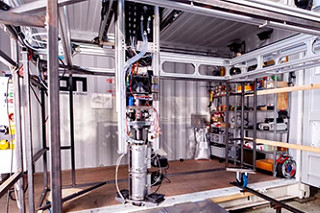
Safe cable routing in the XXL 3D printer
Why go small when you can go big: that was the idea of Robin Godwyll and Chris Walter when they designed the XXL 3D printer. With an installation space measuring 2 x 2 x 2 metres, the industrial designers want to break new ground in manufacturing. For example, printing furniture from plastic. However, the mobility of the axis presented the designers with a challenge: safe cable routing. They found what they were looking for at igus®. Thanks to the young engineers support® programme, we were able to provide the students with energy rigs and cables free of charge.
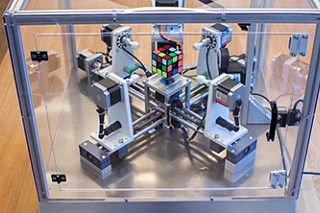
Solving Rubik's cubes with drylin® SHT
Students on the "Mechatronics/Automation" course at the Gütersloh campus of Bielefeld University of Applied Sciences have taken on the existing project of a Rubik's cube solving machine and improved the machine to such an extent that it can be used reliably at trade fairs and information days. The main challenge was the detection of the cube status via image processing, the control of the stepper motor to rotate the cube sides and the complex manual clamping of the cube. drylin® spindle lifting tables now ensure lubrication-free and also jerk-free clamping of the cube from four sides. Ideally, the magic cube can be solved at a speed of 15 moves per second. The underlying solution algorithm requires between 10 and 35 moves. In the best case scenario, the Rubik's cube can therefore be solved in less than one second and thus compete with professional solutions.
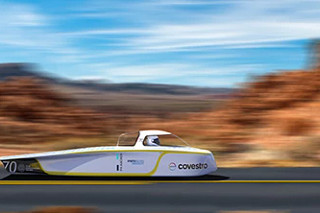
With solar power and igus® plain bearings through Australia
From Darwin to Adelaide: 3,022 kilometres across the Australian desert. The participants in the World Solar Challenge have exactly one week to cover this distance. The cars are only allowed to travel using the power of the sun. The student teams from all over the world are developing different vehicle concepts for this purpose, demonstrating the colourful diversity of sustainable technologies. One of this year's participants in the race comes from Aachen. Team Sonnenwagen took part in the biennial competition for the second time and crossed the finish line in sixth place. The plain bearing technology made of iglidur® tribo polymers from the motion plastic specialist igus® helped them achieve this. The lightweight iglidur® plain bearing technology from igus® can be found in countless places in the Sonnenwagen. For example, self-adjusting igubal® clevis joints made of iglidur® J are used in the telescopic mechanism for the solar car cover and in the steering wheel. The same material is used in the form of plain bearings in the wheel suspension of the rear wheels and in the steering gear.
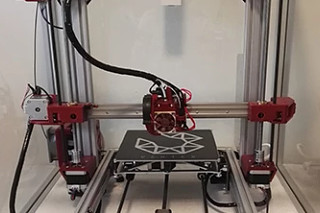
Do it yourself 3D printer
Building your own 3D printer: A project that Jonas Bernhart also took on. For the components, the young engineer reached into the motion plastic box from igus®. To feed his project through, he needed a drylin® R aluminium shaft, which he used to support the y-axis and z-axis. The x-axis brackets were supported by the drylin® R linear plain bearing bushes. He also used the linear bearing bush and igubal® rod end to support the y-axis (the print board). In order to realise a removable print head, he installed a drylin® linear guide rail in the x-axis. At the same time as the mechanical part, he planned the electronics and decided in favour of controlling the stepper motor. For this, he needed chainflex® cable from igus®, which he was able to lay through the aluminium profiles.
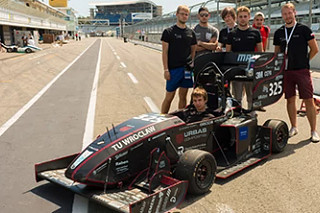
igus® supports teams at Formula Student Germany with polymer plain bearings
At the Formula Student Germany competition, igus® supports international student teams as part of its young engineers support programme. These teams meet annually at the design competition at the Hockenheimring to pit their self-built racing cars against each other. Whether for weight, cost or space problems: the iglidur® plain bearing technology from igus® helps with its lightweight and compact tribo-polymers.
In control systems, in the pedal box, in the suspension or in the engine: everyone achieves their goal by using igus® bearing technology. This is because the plain bearings are not only highly wear-resistant, but also resistant to corrosion and moisture. The PWR Racing Team of the TU Wroclaw (see picture) also relies on the plain bearing technology from igus®.
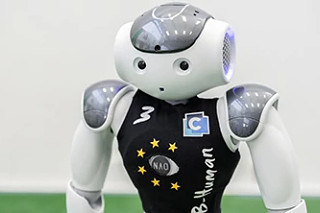
Team B-Human from Bremen wins RoboCup German Open supported by yes
Shoot the ball up, hit the moving ball, jump into the air and get up again after a fall. Not only professional footballers can do all this, but also the robots from B-Human. At the RoboCup German Open - a competition centred around robotics - the team from Bremen regained the German title in the standard platform football league, which they had lost last year. In the final, the team narrowly won 4:3 against the reigning world champions from Leipzig. "Motivated by this great result, we will now be going to the international RoboCup in Sydney from 2 to 8 July thanks to the support of igus®," says Jan Blumenkap from B-Human. We wish the team continued success!
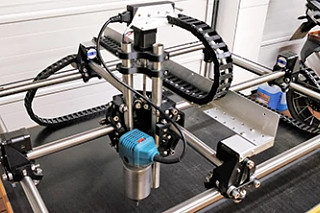
Safe cable routing on Mostly Printed CNC
CNC milling machines are becoming increasingly popular with hobbyists. They are quick and cost-effective to build and can be used in a variety of ways. Be it as a milling machine, laser cutter or 3D printer. One of these hobbyists is Kay Thömmes. The mechanical engineering student has been dedicating himself to exciting home-made projects for several years. He has already used a lubrication-free linear plain bearing bush from igus® to build a 3D printer. For his Mostly Printed CNC milling machine, Thömmes once again opted for igus® components: Highly flexible chainflex® cable and secure e-chain® ensure reliable cable routing on the three axes. The project was funded by igus® as part of the young engineers support programme.
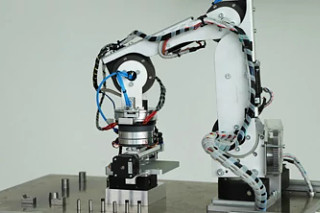
yes supports young mechanical engineers with robolink®
At Heidenheim University of Applied Sciences, a team of six young mechanical engineering students built a robot as a project that can autonomously assemble components and rebuild itself in its basic structure. The path was the goal: the robot had to be developed, designed and programmed by the students themselves within three months.
The choice fell on a 5-axis articulated robot, which offers many possible applications thanks to the interchangeable end module. In addition, both screwing and gripping tools can be mounted. A closed-loop stepper controller and motors with encoders were used for the control system. The robot is controlled via a self-written programme. Accuracy is ensured by four robot joint robolink® D from igus®. A self-locking worm gear in each joint ensures the optimum load-bearing capacity of the robot. Furthermore, the igus® joints are low-maintenance and no further lubrication is required thanks to the high-performance polymers.
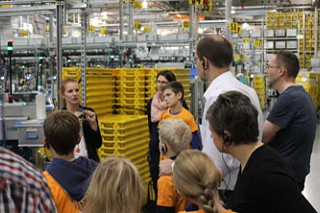
yes - the y stands for young
The igus® plant in Porz received a visit from the VDI youngsters - the VDInis. During the three-hour event, parents and children learnt numerous things about plastic, motion plastic and the company igus®, including a tour of the plant followed by an e-chain® craft session.
The VDInis were already familiar with the term plastic. However, high-performance plastics, injection moulding and motion plastic were not. In a half-hour presentation, the VDInis and their parents were informed about plastic, igus® and its products.
After the presentation, there was a short refreshment and then it was time for the centrepiece of the event: the factory tour. There was a lot to see here: from material preparation, injection moulding machines and test laboratories to automatic e-chain® assembly using robots and ready-made readychains.
Afterwards, the participants made colourful bracelets, necklaces and even a skipping rope from e-chain® links.
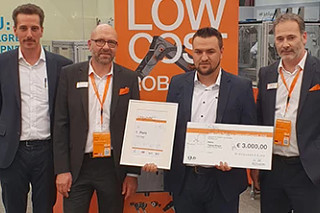
Winner of the Low Cost Robotics ideas competition has been announced
Robert Hofmann GmbH impressed the jury with an idea for time-saving automation in 3D printing. The prize, a voucher for 3000 euros for a robolink® D robot arm from igus®, is intended to turn this concept into reality. The low-cost robot would be used in the company's training centre. This innovation should make the manual replacement of building plates in the company's own 3D printer superfluous. This would allow the system to be fully utilised. It would also be easy and convenient to control via a smartphone app.
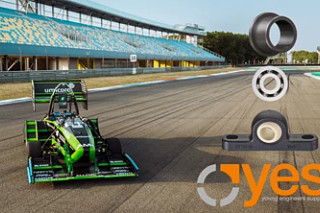
Start of the Formula Student season with igus® plain bearings in racing cars
At this year's first Formula Student event in the Netherlands, the eMotorsports team from Cologne University of Applied Sciences achieved its first success. Equipped with lubrication-free iglidur® plain bearings and compensating igubal® pillow block bearings in the pedals as well as low-friction Tribo-Tape sliding film in the steering gear and maintenance-free xiros® polymer ball bearings in the aerodynamic components, the team was able to secure a place in the top ten.
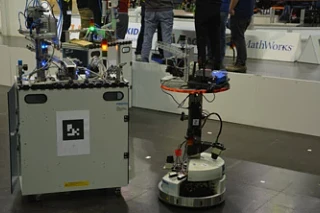
RoboCup German Open 2018: On the podium with igus®
They play football, master rescue missions and take over logistics in a smart factory: robots competed against each other at the RoboCup German Open 2018 in Magdeburg in April. The Carologistics team became German champions in the logistics league - with the support of motion plastic specialist igus®.
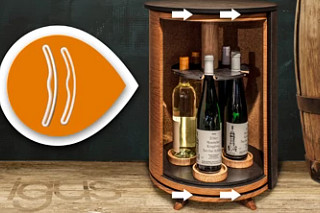
Stylish wine storage with 3D-printed igus® springs
Covering 141,000 square metres in eleven halls, the Cologne trade fair will once again be the world's largest furniture store during IMM. This is where the industry's creative minds showcase their innovations. In design as well as in material. 15 budding wood technicians from the Gsechs University of Applied Sciences in Hamburg will be exhibiting a particularly elegant wine storage series made of teak/oak, cork and slate veneer at the trade show. In their furniture, they rely on lubrication- and maintenance-free plain bearing components from igus®.
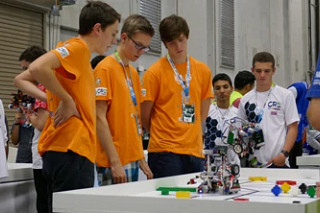
With igus® to the World Robot Olympics 2017 in Costa Rica
This year, igus® is supporting the Robo TV team from Overather Paul-Klee-Gymnasium at the World Robot Olympiad in Costa Rica. The aim of the competition is to fulfil a task within a defined time frame using a self-assembled Lego robot and self-programmed software.
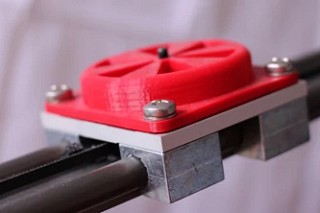
Moving quietly with drylin® W in camera control
Paul Saul turned to the Young Engineers Support team at igus® with the idea of building a camera slider that could create automated and moving time-lapses as well as smooth tracking shots in short films. Due to the quiet running and low vibration of the igus® linear guide, the student decided in favour of a drylin® W rail with a matching carriage. A stepper motor connected to the carriage via a belt drive moves the camera on the rail. This type of motor was chosen in order to achieve the greatest possible precision in positioning and a high running speed at the same time. Precision is particularly important for focus stacking and for ensuring a constant distance in time-lapse shots. The dedicated student printed both the camera mount and the motor mounts using his own 3D printer.

Well hidden with drylin® N
This journeyman's piece is a piece of hallway furniture in oak and anthracite lacquered MDF, which has a sliding worktop that allows a secret compartment to be accessed. This invisible guidance is made possible by the use of the drylin® miniature guide system N17 between the worktop and carcase.
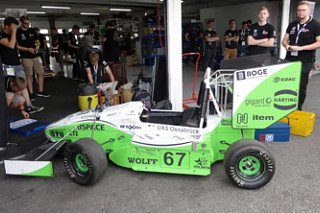
Quick success with igus® plain bearing technology in Formula Student racing cars
This year, 115 teams from 25 nations competed against each other at the Hockenheimring in the international design competition. Once again, the students relied on the lubrication- and maintenance-free products of the motion plastic specialist igus®. Whether linear guide in the pedals, dry-mounted carbon shaft in the steering drive or rod end in the wishbone - igus® products can be found in a wide variety of application scenarios.
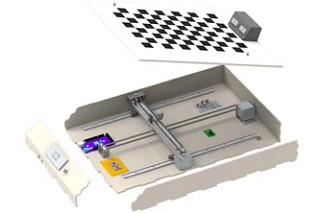
Checkmate by magic: igus® linear systems allow game pieces to glide
Chess is one of the most popular head sports, which can be fun not only in pairs but also alone. With the "Chess Buddy", Sebastian Jahn and Julian Krydl have developed a new generation of chess robots as part of their diploma thesis. It reacts directly to the moves of the opponent and moves the pieces completely autonomously. The motor-driven inner workings of the Chess Buddy consist of two precision aluminium shafts on which lubrication-free drylin® R plain bearings allow an electromagnet to glide quietly and with low vibration to position the pieces.
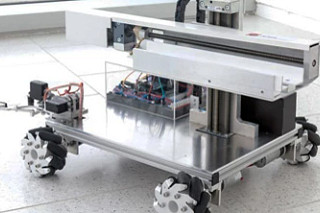
Building blocks with ACHIM: Construction of a mobile manipulator sponsored by igus®
The task of a group of students from Heidenheim was to design and build a mobile manipulator that could pick up ten wooden cubes and stack them at a different location in the room in a device provided for this purpose. The team decided to place the cubes in a rail on the manipulator using a gripper. The rail takes on the function of a magazine that can hold up to five cubes. As the ejection position is at a higher level, the height adjustment is ensured by a spindle drive. An additional spindle drive ensures that the cubes are ejected in a horizontal direction. In order to realise the project on a low budget, the team turned to the Young Engineers Support from igus®. Together with the sales department, the drylin® E spindle drives and the drylin® SLW spindle with matching bearing were selected for the project and successfully installed in the manipulator, which the team named ACHIM (Automated Cube Handling and Insertion Manipulator). The result is impressive, because with the lubrication- and maintenance-free spindle and suitably designed motors, the manipulator can pick up the required ten wooden cubes within four minutes, turn them and drop them in the right place.
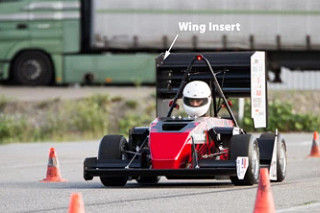
Fast to the finish line thanks to printed wear-resistant parts from igus®
In the world of Formula Student, lightweight construction and innovation are integrated into day-to-day business. The installation of a DRS (Drag Reduction System) for the Formula Student Team Global Formula Racing from Friedrichshafen also required lightweight yet stable and wear-resistant components, which is why the team turned to Young Engineers Support. Using the 3D printing service from igus®, the team was able to print the wing inserts quickly and easily. The inserts allow the wing to be stable and flexible at the same time. The precise and fast production meant that the inserts were immediately attached to the wing profile.
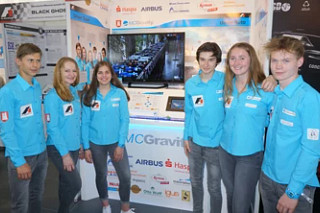
With iglidur® bearings at the German Championships
The MCGravity team, sponsored by igus® with plain bearings, successfully took 6th place in the German Formula 1 at Schools Championships. A total of 230 teams from all over Germany wanted to win the coveted Formula 1 at Schools Cup. The Hamburg team had already finished runner-up in the state championships and secured a place at the German Championships along with 16 other teams. There, the team was able to compete in various categories, such as fastest car or team stand.
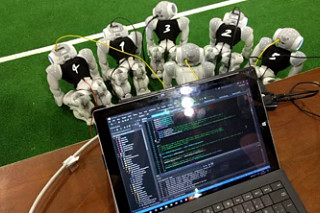
B-Human sponsored by igus® wins Robocup German Open
The B-Human team from the University of Bremen, sponsored by igus®, has once again won the Robocup German Open as the best German football robotics team after a thrilling final match against the HTWK team from Leipzig with a score of 4:1. The team had already beaten the competition from Germany, Switzerland, Luxembourg and Italy in the preliminary round and the semi-final. The German champions are now preparing for the upcoming world championship in Japan, where they will be aiming to defend their world championship title.
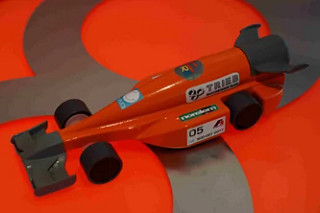
Runner-up in Bavaria with igus® polymer plain bearings
The Infinite Speed team from Jakob Fugger Gymnasium was able to take home the title of runner-up in Bavaria at this year's F1 in School South-East regional championship. The team from Augsburg used iglidur® J3 plain bearings in both the chopping axle and the front spoiler. The team box from Infinite Speed also impressed the jury. The jury was particularly impressed by the idea of displaying information about the team members and the car on a touch display using self-programmed barcodes, so that the team received the special prize for the best team stand among the senior teams from Bavaria, Hesse, Austria and Holland.
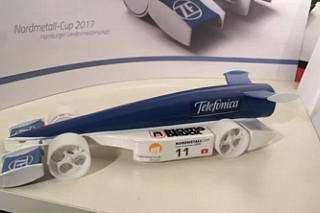
igus® products help to win
The Frantic Racing Team from the Grootmoor grammar school in Hamburg won first place for the best design with their racing car at the Hamburg state championship of Formula 1 at the school. igus® supported the team both in the prototype construction and in the final car with xiros ball bearings from xirodur® B180. In addition, plain bearings made of iglidur® G were used in the guide elements. For the races in Formula 1 at the school, the vehicle is mounted on a guide chord so that it remains safely on the track over the entire distance. In order to enclose this chord as securely as possible, the students installed our plain bearings on the underside of the vehicles.
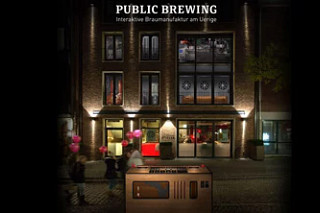
yes supports the interactive media façade of the "Public Brewing" project
The "Public Brewing" project is an interactive media façade on the building of the Uerige brewery in Düsseldorf. igus® drylin® ZLW sponsored the project so that the virtually produced beer, after the visitor has controlled the process from malt milling to bottling by operating various buttons, pumps and cranks, also comes out as a real specimen.
Consulting
I look forward to answering your questions

Anja Görtz-Olscher+49 2203 9649 655Write e-mail
Shipping and consultation
In person:
Monday to Friday from 7 am - 8 pm.
Saturdays from 8 am- 12 pm.
Online:
24h
WhatsApp-Service:
Montag – Freitag: 8 – 16 Uhr